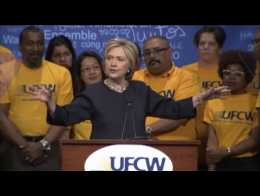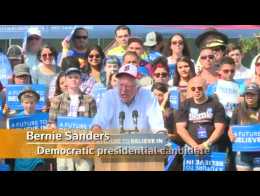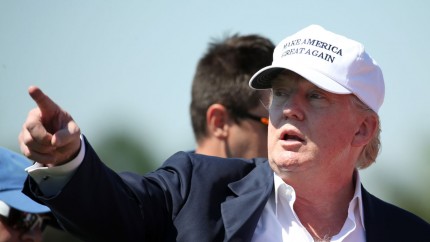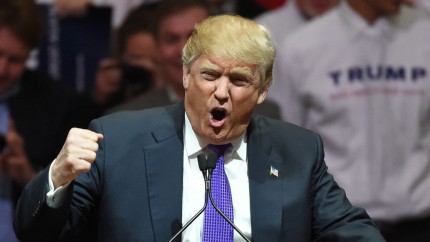US election 2016: How Bernie Sanders can beat Hillary Clinton
Socialist senator could still secure Democratic nomination, but it's all up to California and the superdelegates

Josh Edelson/AFP/Getty Images
Pundits have all but called the Democratic presidential race, with many arguing that Hillary Clinton now has an insurmountable delegate lead over rival Bernie Sanders.
However, the socialist senator and his supporters still remain confident of a win - and some experts say a victory is not yet impossible.
"There is now more than a theoretical chance that Clinton may not be the Democratic nominee for president," Douglas E Schoen, a former pollster and political adviser to Bill Clinton, writes for the Wall Street Journal.
Here's how Sanders could still clinch the nomination:
Winning big in California
Democrats vote in California, Montana, New Mexico, New Jersey, and South and North Dakota next Tuesday. The Golden State is by far the biggest prize, with more delegates up for grabs than anywhere else the country and polling suggests the two politician are virtually neck-and-neck - the former secretary of state has seen her lead narrow in recent weeks.
The primary is open, meaning independents can vote. "In other states, such voters have favoured Sanders over Clinton," says The Guardian. "There have also been 1.5 million new registered voters, many under 30, a demographic Sanders has won elsewhere by enormous margins."
Sanders highlighting differences with Clinton in New Mexico
These are all encouraging signs for the senator, says Schoen. "A Sanders win in California would powerfully underscore Mrs Clinton's weakness as a candidate in the general election."
Persuading superdelegates to ditch Clinton
Superdelegates, typically current and former party leaders who have a free choice over which candidate they support, will prove crucial in determining the outcome of the Democratic race.
"They really can tip the scales if it's close," says MSNBC's Jacob Soboroff.
Clinton currently enjoys strong support from the superdelegates, but there is still a chance they could be persuaded to switch sides. Sanders has long argued they "don't vote until they're on the floor of the Democratic convention".
Superdelegates "would seriously question" whether they should continue to stand behind Clinton's candidacy if Sanders won in California, says Schoen in the WSJ. They could also be swung by recent national polling which puts the senator way ahead of Clinton when faced against presumptive Republican nominee Donald Trump.
"Still, the challenge Sanders faces is steep," says The Guardian. "[But] few attendees at Sanders rallies – least of all Sanders – seem the least bit fazed."
US election 2016: Sanders and Clinton battle for Kentucky and Oregon
18 May
Hillary Clinton pulled off a narrow victory in the Kentucky Democratic primary yesterday after acquiring 46.8 per cent of the vote, beating her main rival Bernie Sanders who won 46.3 per cent.
The result means that the state's 60 available delegates will most likely be evenly divided between the two candidates.
In the Oregon Democratic primary, Sanders looks to have secured a solid win over Clinton, as he is holding a 6 per cent majority with just over 60 per cent of the ballots counted.
It is a much-needed win for Sanders, who is seeking to capitalise on his success in Oregon to boost his campaign's momentum in the lead up to the final rounds of voting.
"We are going to win Washington, we just won Oregon, and we are going to win California," he declared.
To win a majority of pledged delegates by the convention in July, Sanders would require 67 per cent wins from here on out, reports The Guardian.
The Vermont senator faces an uphill battle, as Clinton closes in on the nomination.
"Front-runner Mrs Clinton is almost certain to secure the nomination in July, with a significant delegate lead," the BBC says. She has won 94 per cent of delegates needed to win the nomination, a total of 24 states to Sanders' 19.
The Republican Party also held its primary in Kentucky yesterday, with presumptive nominee Donald Trump securing 66.6 per cent of the vote.
US election 2016: Sanders starts 'another winning streak'
11 May
Bernie Sanders scored a resounding victory over Hillary Clinton in the West Virginia Democratic primary yesterday, taking the state by at least 14 per cent.
It is the 19th victory for the senator, who still trails by 287 pledged delegates and 484 super-delegates in the race for the presidential nomination.
After this victory and his triumph in Indiana last week, Sanders has started "another winning streak", says the BBC, but, like his five-state run in April, "it will do little to slow [Clinton's] steady march to the Democratic nomination".
The victory has added renewed vigour to his campaign, with Sanders vowing to continue to campaign all the way to the Democratic convention in July.
"We fully acknowledge - we are good at arithmetic - that we have an uphill climb ahead of us. But we are used to fighting uphill climbs," he told supporters.
Republican National Committee chairman Reince Priebus used the latest Sanders victory to attack Clinton over her perceived inability to unite the Democratic vote.
"It is nothing short of embarrassing that Hillary Clinton has now been defeated 20 times by a 74-year-old socialist from Vermont," he said.
Primaries are continuing in the Republican fight, despite Donald Trump running unopposed. He scored more than 61 per cent of the vote in Nebraska and cruised to an easy victory in West Virginia, with more than 76 per cent of the state's Republican voters behind him.
Trump's latest win will likely bring him "within 100 delegates of victory", reports The Guardian.
US election 2016: Sanders beats Clinton in Indiana
04 May
US presidential candidate Bernie Sanders scored a narrow victory over fellow Democrat Hillary Clinton in Indiana, taking the state by 4.8 per cent.
However, due to the proportional allocation of delegates in the Democratic race, the two candidates will get a relatively even split of Indiana's delegates, leaving Sanders with a lot of ground to make up before the party convention in July.
"I understand that secretary Clinton thinks that this campaign is over. I've got some bad news for her – tonight we won a great victory in Indiana," said the senator.
Victory came at a price - Sanders spent $1m (£700,000) on television advertisements in the state. Clinton did not run any ads as her advisors predicted that she would lose, notes the New York Times.
Sanders's campaign was given "a moral boost if not an actual path to the Democratic nomination", says Vox.
Clinton has received many millions more votes than her rival, giving her more of the pledged delegates who ultimately determine the nominee. Sanders believes he has a "real shot" in West Virginia, Kentucky and Oregon in the coming weeks but would need to win 66 per cent of the remaining pledged delegates to claim a majority, says Vox.
Nevertheless, he and his supporters are still fighting to gain leverage over the Democratic establishment.
"Sanders still has an unprecedented opportunity to leave a stamp on the Democratic Party," says Jamelle Bouie, Slate's chief political correspondent. "By fighting in remaining primaries and caucuses – by raising huge sums and drawing massive crowds – Sanders can show the extent to which his message resonates with millions of Democrats, including the young voters and activists poised to lead the party in the future."
All of this can help him mould the party platform and "win real concessions" from the Clinton campaign, on "everything from the shape and design of future primaries to actual policies", says Bouie.
US election 2016: Bernie Sanders falls behind in New York
20 April
Hillary Clinton has cruised to victory over Bernie Sanders in the Democratic primary in New York, despite early exit polls suggesting it would be a close race.
The former US secretary of state gathered nearly 58 per cent of the votes, a significant improvement on CNN polling that suggested a "much tighter margin" of 52 to 48 per cent.
"The race for the Democratic nomination is in the homestretch and victory is in sight," said Clinton.
She will take a large number of New York's 247 pledged delegates, building on what was already a 244-delegate edge entering the vote.
The win is potentially extremely damaging to the Sanders campaign, which has faced an uphill battle since Super Tuesday, says Richard Wolffe in The Guardian.
"Sanders fell so far behind Clinton in the delegate count that he needed lopsided victories to get back into contention for the convention," the journalist writes. "That didn't happen in New York on Tuesday night. And according to the polls, it won't happen in any of the big states left: Maryland, Pennsylvania, California and New Jersey."
On the Republican side, Donald Trump also recorded an emphatic win, giving his campaign a much-needed boost towards securing the nomination with an outright victory.
Trump took 60 per cent of the vote, 35 points clear of John Kasich. The businessman's closest contender, Ted Cruz, came a distant third with less than 15 per cent.
In his victory speech, Trump took aim at the Republican establishment, repeating claims that the nomination process is being used against him by party heavyweights who don't want him to win.
"It's a crooked system. It's a system that's rigged and we're going to go back to the old way: it's called, 'You vote and you win,'" he said.
Democratic debate gets heated as Sanders goes on the attack
15 April
Democratic presidential hopefuls Hillary Clinton and Bernie Sanders went head-to-head in a heated debate in New York last night.
Sanders, who had previously tried to steer clear of personal attacks, went on the offensive as soon as the opening bell rang, criticising the former US secretary of state for her relationships with Wall Street.
"I do question her judgment," the senator said, also citing Clinton's backing of the US invasion of Iraq. "I don't believe that this is the kind of judgment we need to be the kind of president we need."
But Clinton gave as good as she got, attacking her rival for an embarrassing interview with the New York Daily News, in which he struggled to explain one of his key policies.
"Talk about judgment and talk about the kinds of problems he had answering questions about even his core issue – breaking up the banks," Clinton said. "I think you need to have the judgment on day one to be both president and commander-in-chief."
Such was the intensity of the debate that at one point, the moderator was forced to interject. "If you're both screaming at each other, the viewers won't be able to hear either of you," CNN's Wolf Blitzer told them.
"The tone was a contrast to the last debate, held more than a month ago in Florida. That encounter revealed weary candidates who were at times hesitant to engage," says ABC News.
But pundits were split on who came out on top. "Clinton didn't knock Sanders out. But she definitely won on points," says the Washington Post. "Clinton drove home – again and again – the idea that Sanders talked a good game but couldn't back it up."
Vox, however, thinks the senator was the clear winner. "The whole debate saw Clinton on defence and Sanders on offense. When she did attack, he deflected easily and went back to landing punches."
The debate comes at a crucial moment in the race for both candidates. Clinton has a more than comfortable lead in the polls and the delegate count, but Sanders has gained momentum after winning eight out of the last nine contests.
Tuesday's primary in New York is the next major prize up for grabs.
US election 2016: Bernie Sanders takes 'risky' trip to the Vatican
14 April
Bernie Sanders has baffled pundits by planning a two-day trip to the Vatican during a crucial moment in his campaign to secure the Democratic US presidential nomination.
The Vermont senator (pictured above) will speak at an academic conference hosted by the Pontifical Academy of Social Sciences on economic and social justice tomorrow.
But the timing of the trip, four days before the important New York primary, has raised eyebrows.
The Wall Street Journal said Sanders was taking "some of the boldest and potentially riskiest steps of his campaign" by attempting to boost his international profile at a make-or-break point in his candidacy.
"My advice to Bernie would be, 'Don't go to the other side of the Hudson River. Stay here where you belong,'" Hank Sheinkopf, a non-aligned Democratic strategist, told the newspaper.
Despite having won eight of the last nine contests, Sanders remains significantly behind rival Hillary Clinton in the current delegate count.
New York is a key battleground for both candidates, with more delegates at stake than in any other state bar California. Opinion polls currently give Clinton a double-digit lead.
Last night, an estimated 27,000 supporters gathered to hear a defiant Sanders speak at a rally in Washington Square Park.
Acknowledging it would be a "tough primary for us", he told the crowd: "If we have a large voter turnout on Tuesday, we're going to win this thing."
Clinton and Trump suffer setbacks in Wisconsin
6 April
They were unlikely to have commiserated together, but Donald Trump and Hillary Clinton both saw their high-flying campaigns take a knock in the Wisconsin primaries last night.
Republican frontrunner Trump trailed in at second place, more than 18 per cent behind Texan senator Ted Cruz, with party moderate John Kasich languishing yet again in third.
"Although Wisconsin only offers a handful of delegates - 42 total for Republicans and 86 tied directly to the Democratic primary - Tuesday's contests will serve a pivotal role in candidates' momentum ahead of the important New York primaries later this month," CNBC reports.
The Trump campaign once again accused Cruz of illegal activity – a charge they first levelled after he left The Donald with a bloody nose in the Iowa caucus in February. In a statement released after polls had closed in Wisconsin, they claimed the Cruz campaign had been "coordinating with his own Super PACs (which is illegal) who totally control him" and that the Senator was "worse than a puppet."
In his victory speech, Cruz focussed not on defeating Trump, but on Democrat favourite Clinton, an indication his campaign is now looking beyond the Republican contest to the race for the White House in November.
"Hillary's still struggling to put away a 74-year-old socialist who never before sought office as a Democrat," he said.
With none of the remaining candidates expected to secure enough votes to lock in the nomination outright, it is looking likely that Trump and Cruz will have to fight it out at the Republican convention in July. This would be good news for Cruz, as political analysts believe Trump's chances of securing the Republican establishment's backing are "slim", The Hill reports.
On the Democrat side, Bernie Sanders added further momentum to his campaign with a comfortable win.
"The corporate media and political establishment keep counting us out, but we keep winning states," the veteran senator for Vermont told his supporters.
Clinton did not make a public appearance, instead attending a private fundraiser. However, she tweeted congratulations to her rival, who has won a string of comfortable victories in the majority-white states where his support is highest.
Still, Sanders will have to deliver votes well above his current levels of support if he hopes to win the party's nomination - highly unlikely but still mathematically possible, with delegate-heavy states such as New York and California still to cast their votes.
US election 2016: Clinton pledges to declassify 'UFO files'
29 March
Democratic frontrunner Hillary Clinton may have won herself a whole new raft of voters after saying she would declassify government files on Area 51 should she become president.
The White House hopeful told TV chat show host Jimmy Kimmel she wanted to dig deeper into the mystery surrounding the US airbase, which has become a focus of UFO and conspiracy theories.
"I would like us to go into those files and hopefully make as much of that as public as possible," she said.
The documents have been the subject of a number of conspiracy theories over the years, the most famous being the myths surrounding the Roswell incident of 1947, when an alien spaceship is said to have crash landed in New Mexico. It is claimed that the US government has been storing and examining the UFO and its inhabitants in Area 51.
Clinton told Kimmel that she was willing to end the debate once and for all.
"If there's nothing there, let's tell people there's nothing there. If there is something there, unless it's a threat to national security, I think we ought to share it with the public," she said.
In reaction to Clinton's comments, Stephen Bassett, the US's only registered lobbyist on UFOs, said he hoped the issue will be broached in upcoming Democratic debates.
"The only circumstance under which a leading presidential candidate, her president husband and their common advisor would repeatedly speak to the extra-terrestrial issue during a campaign is when their collective brain is fully aware the ET presence is fact," he told the Daily Mirror.
Appearing on Kimmel's show in 2014, Clinton's husband, former president Bill, said he had, "sort of" looked into Area 51 while in power but that there were no dead aliens there.
Clinton still holds a large lead in the race to become the Democratic party's presidential nominee but has faced a sustained challenge from Vermont senator Bernie Sanders.
US election 2016: Why Bernie Sanders is popular with Americans abroad
23 March
Bernie Sanders may be trailing Hillary Clinton inside the United States but he has cruised to a big victory among Americans living outside the United States.
The Democrats Abroad global primary, which saw 34,570 US citizens in 170 countries voting between 1 and 8 March, gave the Vermont senator 69 per cent support to the former secretary of state's 31 per cent.
"This political revolution that is gaining momentum across America is now resonating all over the world," said the senator in a statement.
The result is a morale-booster for the self-proclaimed democratic socialist after Clinton swept all five primaries on 15 March and gives him nine pledged delegates.
After also notching up significant victories in Idaho and Utah yesterday, Sanders now has a total of 901 pledged delegates to Clinton's 1,214 – with 2,383 needed to win the nomination.
Despite criticism of his vague foreign policy stances, Sanders won comfortably in each returning Middle Eastern country. The only nations where Clinton had more votes were the Dominican Republic, Nigeria and Singapore. The top five countries for voter turnout were the UK, Canada, Germany, France and Spain.
Katie Solon, the international chair of Democrats Abroad, told the New York Times the strong turnout – up 50 per cent on 2008 – was because Sanders and Clinton had "engaged with overseas Americans like no other presidential campaigns".
David A Graham at the Atlantic says the poll provides an interesting snapshot of opinion abroad, but its meaning is "less than clear".
"It seems likely that Americans who live abroad are a more liberal group, which would explain their tilt toward Sanders," he writes.
Vice News suggests Sanders's big win can probably be explained by the demographics of the far-flung voters. It quotes Alex Montgomery, director of communications for Democrats Abroad, who believes excitement over the primary has drawn out primarily young voters.
Half of the new sign-ups were under 30, said Montgomery – and Sanders tends to do better among the young.
The vote also threw up a couple of surprises. Former Maryland governor Martin O'Malley received 21 votes from around the world, despite suspending his campaign in February, while real estate tycoon Rocky De La Fuente could only manage six votes.
US election 2016: Why Bernie Sanders won't pull out
18 March
US presidential candidate Bernie Sanders has said it is "absurd" to suggest he throws in the towel, despite Hillary Clinton's large lead in the race for the White House.
The Vermont senator was responding to reports that President Barack Obama had called on Democrats to rally around Clinton as the party's likely nominee.
In "unusually candid remarks", Obama told a group of Democratic donors last Friday that Sanders was nearing the point at which his campaign would end and that the party must soon come together to back his rival, reports the New York Times. The White House has said the President did not indicate which candidate he preferred.
Sanders, however, has vowed to continue the fight, telling MSNBC: "The bottom line is that when only half of the American people have participated in the political process… I think it is absurd for anybody to suggest that those people not have a right to cast a vote."
He added: "To suggest we don't fight this out to the end would be, I think, a very bad mistake. People want to become engaged in the political process by having vigorous primary and caucus process. I think we open up the possibility of having a large voter turnout in November. That is exactly what we need."
Clinton succeeded easily in the Florida, North Carolina and Ohio primaries on Tuesday, but her lead narrowed in Illinois while in Missouri, only 0.2 per cent separated her from Sanders, raising the possibility of a recount. However, Sanders conceded defeat yesterday, saying he preferred to save the taxpayers of Missouri money rather than challenge the result.
Sanders will not be the Democratic nominee but "his revolution is just getting started", with his supporters likely to shape the future of the party, says Joshua Green at Bloomberg.
He points out that millennials, Sanders's most ardent supporters, were not eligible to vote when Obama first ran. This year, they equal the number of baby boomer voters and by 2020, will easily outnumber them.
"No one should make the mistake of assuming that just because he'll go away, the agenda he speaks for will, too," says Green.









.jpg)



